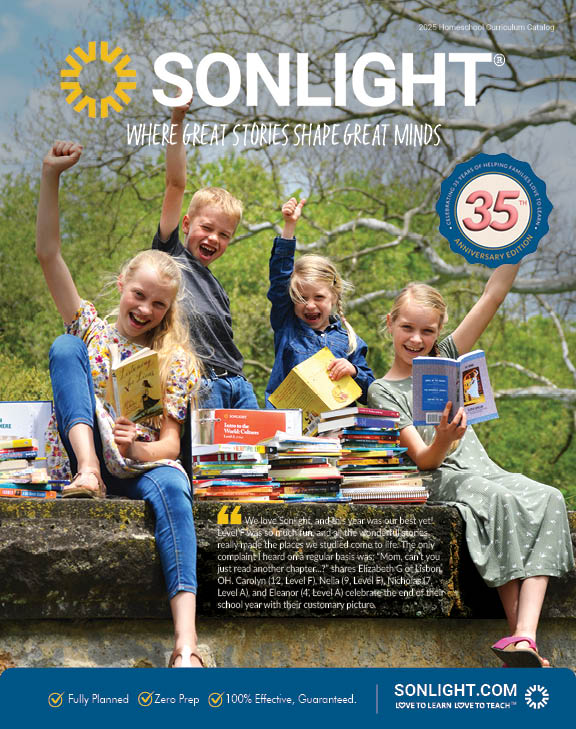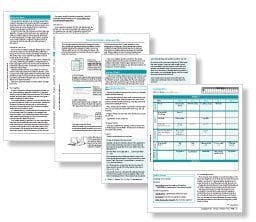Sonlight's Educational Philosophy
At Sonlight, we believe that homeschooling is a way of life and an overarching attitude toward the world. The world is out there to be marveled at, enjoyed, explored, and learned from. Once you catch on to this idea, you will find it easy to see educational value in almost everything you do.

No More Boring Textbooks!
Sonlight's homeschool curriculum "secret" comes down to this: we believe most children respond more positively to great literature than they do to textbooks. Books – quality books – can distill the wisdom of an entire life into the span of a few pages. They can feed us with spiritual insight beyond imagination. Whether written by Christians or non-Christians, great books help us to develop critical thinking skills. They cause us to question the validity of our own values and beliefs in light of the author's perspective.
These benefits of great literature have inspired us to build our Christian homeschool curriculum on quality books that present content in a highly engaging fashion. Once a good book grabs your child's attention, you'll find that the educational process becomes relatively painless – because your child will actually want to read!
Explore the Wonder of the World
Though Sonlight has concentrated times set aside to read books, write papers, and work through math texts, our homeschool curriculum encourages you to look for "teaching moments" throughout the day.
Our world is a place of wonder and exploration. Just take a look around – you'll find learning experiences at every turn. Sonlight helps you use your daily encounters with the unfamiliar to teach your children.
If they (or you) don't understand something, look it up. Use a dictionary or encyclopedia. Go to the library. Use the internet. Do some research! Search for the answer together. Make it an adventure.
The World Needs the Gospel
From the start, an evangelical Christian missions worldview has defined and shaped Sonlight. We encourage children to honor God's "Great Commission" (Matthew 28:18 – 20) by gaining an international perspective and a godly heart for the world. It is this missionary concern – the desire that God's name should be known and His glories revealed throughout the world among all peoples – that motivated our decision to study history from an international perspective.
God's plans are for all peoples, but most children can't imagine that anyone lives differently than they do. Most have no idea there is a big world filled with people who have completely different experiences from their own. We want to help children understand history as it looks from the perspective of these people who, for social or cultural reasons, see things differently than we do.
Balanced Perspectives
Sonlight actively seeks authors who can speak authentically and authoritatively for groups whose perspectives are different than our own. Why? Because we can only speak persuasively to members of other groups if they are convinced that (1) we have listened to them, (2) we have understood what they are saying, and (3) we have empathized with their perspectives. Then, if we still hold a different perspective, it is despite our obvious understanding of and empathy with who they are and what they have said.
Our goal at Sonlight is to produce a homeschool curriculum that will teach children (and parents) to understand first and judge second. More importantly, we want children to know that God is faithful – they can listen to other perspectives without having their faith destroyed.
If our children can lead others to begin questioning their beliefs, they will have no shortage of people asking them "to give the reason for the hope that [they] have" (1 Peter 3:15). They can then approach a new and unfamiliar situation with the humility and grace appropriate to an ambassador of Christ.
They will have no need to fear because they will learn that the truth – God's truth – will prevail. He who is in us truly is greater than he who is in the world (cf. 1 John 4:4). And He who is by our side will give us the right words to say when the time comes (cf. Matthew 10:18-20). Children come to know this not just in their heads, but also in their hearts, through experience.
Natural Learning
Sonlight's Language Arts programs are based on the "natural learning" approach. "Natural learning" means children learn by discovery. They observe, analyze, and then seek to emulate what they have seen a master wordsmith do before them.
As Dr. Beechick has so strongly noted, this is the method by which Benjamin Franklin taught himself to write. It is the method by which many of the world's greatest authors have learned to put their words together.
The "natural learning" method is not as obviously logical as standard workbook methods. In "natural learning," children will make a discovery and we will reinforce it for them, but they won't find 50 similar "problems" neatly laid out for them to "solve." This method is, in some ways, slower than the traditional workbook method, and for a person who demands a linear path from one topic to another, it can certainly frustrate.
Children have to really puzzle things through and figure them out. They often have to use external resources to help. However, when they finally "get" a principle that they've been struggling to master, they will never forget it! They will understand it thoroughly and be able to apply it in almost any context.
Sonlight uses copying and dictating as the two basic lesson activities in the "natural learning" method. Just as your children learned to speak by copying your correct speech, so they will learn to write by copying fine writing.
These exercises imprint in a child's mind "the flow, sentence structure and sequence of information" a professional writer might use. They also provide relatively easy and interesting practice in correct spelling, grammar, and handwriting.
Sonlight also uses "natural language"-oriented student activity sheets to provide additional instruction in grammar. To help children puzzling through grammar issues, Sonlight has also created comprehensive grammar guides that define grammatical terms and provide examples of their proper use, and give opportunities to practice.
An Engaging Process
Sonlight requires significant parental involvement. Although some things – basic math facts, for instance – are best learned through rote memorization and raw repetition, most other subjects profit greatly from the presence and involvement of an older, more experienced person. You bring your own knowledge and values to the learning process. You can offer your insights into the discussion.
In fact, one of the prime reasons parents want to homeschool is to stay engaged with their children and their educational process ... to pass along to children parents' specific intellectual and cultural heritage.
The Sonlight's Instructor's Guides offer discussion questions for each book. Ask these questions in such a way that you can discern the true import of what your child is saying. Ask follow-up questions of your own. Dig out the meaning of what they're reading.
You have the opportunity to serve as mentor to your own children. What an opportunity!
Interact with your children. Ask questions. Point out similarities and contrasts between what you read in one book with what you read in another. If you find that two books disagree, point out the disagreement – and pursue a solution to the problem. Show your children by example how mature, educated people interact with materials they disagree with.
There are areas of life – skills, perspectives, attitudes – you can never pass on to your children through words alone. These are the intangible qualities and elusive blessings we want our children to enjoy: things like a positive self-esteem; a sense of belonging and of being loved; a love for learning; and an appreciation for beauty. All of these are attitudes, values and methods you can pass on to your children when you interact with them.
Testing
Many parents worry about testing (or not testing) their children. For many of us, it feels uncomfortable to educate without tests!
But we believe the homeschool environment (especially in the early grades when you are reading alongside your children) eliminates the need for written tests.
Classroom teachers with 25 or 30 students can't possibly listen to all of their students expound on what they have learned. You, however, with only one or two – or even three, four, or more – children, can quickly judge their grasp of what they have read.
And, instead of putting your children on the defensive to artificially "prove" their academic skills, you can encourage them to play the role of a teacher. Have them teach you what they have learned. Far better that your children learn to be skilled educators than students who happen to take tests well.
What's Next?
I'm ready to select my materials
GET STARTEDI'd like to talk about my options
CONTACT AN ADVISORI'd like to see a free sample
TRY SONLIGHT FREEAges 3–4
Preschool P
Ages 4–5
Pre-K K
Ages 5–6
K–1 A
Ages 6–8
Grades 1–3 B
Ages 7–9
Grades 2–4 B+C
Ages 8–10
Grades 3–5 C
Ages 8–10
Grades 3–5 D
Ages 9–12
Grades 4–7 D+E
Ages 10–13
Grades 5–8 E
Ages 10–13
Grades 5–8 F
Ages 11–14
Grades 6–9 G
Ages 12–14
Grades 7–9 H
Ages 13–15
Grades 8–10 W
Ages 12–14
Grades 7–9 J
Ages 13–15
Grades 8–10 100
Ages 13–15
Grades 8–10 200
Ages 14–17
Grades 9–11 300
Ages 16–18
Grades 10–12 400
Ages 17–18
Grades 11–12 500
Ages 17–18
Grades 11–12 600
Ages 17–18
Grades 11–12
One of our Homeschool Advisors — veteran Sonlight users who are specially trained to assist you — is available to help answer your unique questions, offer encouragement, and maybe even a word of prayer.
- Chat live with a Sonlight Homeschool Advisor (7am-8pm MST M-F).
- Call 800-903-1675 (International: 303-730-6292).
- Email your question to advisor@sonlight.com.
Don't hesitate to get the answers you need to start enjoying literature-based homeschooling with Sonlight!

REQUEST A FREE CATALOG
Find your ideal homeschool curriculum in the pages of Sonlight's free catalog. Browse Sonlight's award-winning literature-based curriculum and academically excellent products in all subjects—for all grades.

